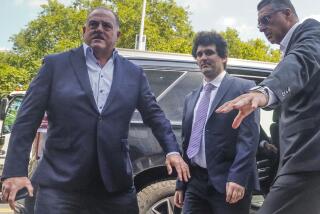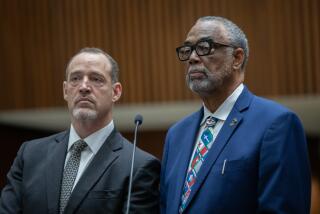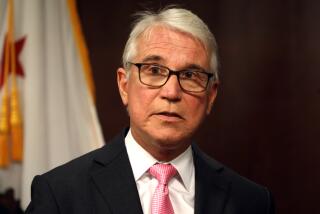No Evidence to Suggest Crime, Hedgecock’s Attorney Argues
- Share via
SAN DIEGO — Charging that the district attorney’s office “resorted to smear tactics and character assassination . . . to distort the picture” of Mayor Roger Hedgecock’s 1983 campaign, defense attorney Michael Pancer argued on Tuesday that there “is not one iota of evidence to suggest” that Hedgecock broke the law in his personal or campaign finances.
In a 4-hour, 17-minute summation that concluded the defense’s case in the mayor’s felony conspiracy and perjury trial, Pancer argued that prosecutors “ignored some pieces of evidence and distorted others” in an attempt to “paint a picture that (conformed) . . . to their crazy, preconceived conspiracy theory.”
“They knew the facts . . . weren’t on their side,” Pancer said, thrusting his fist at jurors to emphasize his point. “They can’t stand the truth in this case, because the evidence shows that Mr. Hedgecock is innocent of each and every one of these charges.”
After Pancer’s closing arguments, Assistant San Diego County Dist. Atty. Richard D. Huffman, briefly began his rebuttal remarks late Tuesday afternoon.
Superior Court Judge William L. Todd Jr. is expected to ordered the six-man, six-woman jury to begin its deliberations late today or early Thursday.
Prosecutors have charged Hedgecock with conspiring with former J. David & Co. principals Nancy Hoover and J. David (Jerry) Dominelli in a scheme to funnel tens of thousands of dollars in allegedly illegal contributions to Hedgecock’s 1983 campaign via a political consulting firm owned by Tom Shepard, a close friend of the mayor. The perjury charges facing Hedgecock allege that he intentionally falsified financial disclosure statements to conceal that and other allegedly illegal financial aid from Hoover and Dominelli.
The defense, however, has characterized the more than $360,000 that the two former J. David officials invested in Tom Shepard & Associates as a routine business investment designed primarily to help Shepard start his own business, not to get Hedgecock elected mayor.
On Tuesday, Pancer used about 40 large placards placed on an easel near the jurors’ box to summarize the defense’s interpretation of the charges facing Hedgecock and key evidence in the case.
One placard listed the 13 conspiracy and perjury counts facing Hedgecock. Pancer claimed that certain charges had been disproved.
“They have not shown a conspiracy in this case,” Pancer said as he drew an “X” through the conspiracy charge.
“If they have not shown a conspiracy, then you cannot convict somebody of perjury for failing to report the conspiracy,” he added, drawing another “X” through some of the perjury charges.
A guilty verdict could result in Hedgecock’s ouster from office.
Based on research of the possible political ramifications of Hedgecock’s legal problems, San Diego City Atty. John W. Witt has said he believes that there are circumstances under which the mayor could be convicted of felonies and still remain in office.
For example, Witt said, the jury could convict Hedgecock of a felony count, but the trial judge, if he believes that the acts warrant a lighter sentence, could downgrade the conviction to a misdemeanor. The situation also would become confusing if Hedgecock were convicted of felonies under state law that are not covered by municipal codes--a situation in which, Witt said, Hedgecock might be forced to vacate his office but could run again in the resulting special election.
Pancer on Tuesday attacked the credibility of a key prosecution witness, investment counselor Harvey Schuster, whom the attorney called “a liar . . . who provides the only support” for the prosecution’s case.
Last month, Schuster testified that Hedgecock had told him in November, 1981, that he knew that Dominelli planned to invest heavily in Shepard’s firm so that it could run Hedgecock’s mayoral campaign, an allegation that directly conflicts with Hedgecock’s often-stated denial of any knowledge of Dominelli’s involvement with the political consulting firm.
Pancer, however, argued Tuesday that Schuster’s “story is not just incredible, it is impossible.” He pointed to testimony from several defense witnesses who said that Hoover and Dominelli were still seriously contemplating purchasing a North San Diego County magazine for Shepard to run in December, 1981, which was after the time that Schuster claims that Hedgecock told him about the consulting firm.
It was not until after those plans fell through that Hoover agreed to finance a consulting firm for her close friend Shepard, Pancer said.
More to Read
Sign up for Essential California
The most important California stories and recommendations in your inbox every morning.
You may occasionally receive promotional content from the Los Angeles Times.













